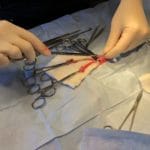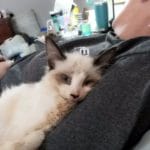Hello,
Thank you for helping. I honestly feel like the best course of action right now is to get a diagnosis. Even a presumptive one. For this I think you should do the following. Find a cat vet or a very reputable vet that you trust for an exam. And then I would talk about checking the thyroid a fecal and probably also a urinalysis. For most of the cases lien this I just feel that I need a full set of basic diagnostics before I can begin to offer treatment plans. Otherwise I am eating precious time guessing and very likely guessing wrong. Things like intestinal parasites and hyperthyroid disease can be affordably treated. But cannot, and definitely should not be treated without confirmation. After that I talk about xrays and an ultrasound. I’m sorry. I can’t tell you what to do without knowing what it might be. And that list is very long. Start with the basics. An exam and a fecal. Talk about thyroid and go from there. Good luck. Let us know. Thank you for helping.
Hey everyone! I was hoping I can get some insight on how to battle for ringworm in my household? we adopted a cat from the humane society and they were not aware that he had ringworm and it has passed to the 2 humans in the house and the other cats.
I’ve been doing the daily cleaning, washing the sheets, vacuuming, spraying Lysol, wiping surfaces down, etc. I got topical medicine for both humans and cats.. I have lime sulphur on order. I also have deep played my couch covered with plastic and tarp and sheets. Cat towers are outside to be cleaned and stored away until it’s over.
Is there any of suggestions? If I would lock my cat’s in the basement and keep them away from the living quarters could that possibly help keep it contained and help eliminate the issue?
Thanks in advance! I appreciate any opinions!/advice I may get! ????
Comments
I’m taking care of a Siamese who’s over 10, an indoor/outdoor cat. I did a cbc & chem bloodwork. His BUN is only slightly elevated. His issue is throwing up daily, weight loss, & diarrhea. His vomit is undigested food & liquid. He eats very little wet food & his owner just feeds all of them the worst dry food. I give him sq fluids as needed & started cerenia. Yet this is not treating the underlying cause. Does anyone have any advice on this? I have vet bills for my cows & my cats. Yet i still want to help all the animals I can. I obviously have very little money to help though. Thanks
Comments
My two cats got into a tussle, and one of them has a scratch right down the center of his nose. He doesn’t seem to be bothered, but I don’t want it to get infected. What should I do?
Comments
Our 9 y.o. English Bulldog, Max, is experiencing a very itchy face only on the right side. He will scratch daily and it sometimes becomes raw. We have moved to Colorado, but have not established a veterinarian here yet. With COVID-19, I do not want to take him out to the vet unless it is the only way to treat this. Is there something I can get online? I have seen great reviews for Coat Defense which, according to reviews, is used successfully for itchy skin on horses, dogs, and cats. Do you have any experience with that product or is there something else that could address both the itchiness and the root of the problem that you might suggest?
Comments
For 20 something years, my male & female (a year older) older cats who were neutered & spayed for about 17 years. My female cat has now started to do number 2 on the floor over in the corner floor areas around the litter box. I don’t get it? Why now after All these years? How can I stop this? If I get another litter box, he will have to use it as well. And I can’t keep them in a room apart (that would be cruel) – they’ve had the run of the house for 26 years. I’d appreciate the help. Oh! The only real thing that has changed has been that our dog died (we took him outside to potty ). I’m wondering what’s going on & how to stop this? Thank you.
Comments
4 days ago my cat began acting really lethargic. She has been sleeping all day and won’t move. I offered her canned food on day 2 and she scarfed it down as well and drank water. Over the last 48 house she has declined severely. She is eey weak and has lost and extreme amount if weight despite my efforts. I have been syringe feeding her, stimulating her, administered Pedialyte as well as tried to maintain her hydration. I began subcutaneous fluids yesterday and she is still of a deep decline. I’m afraid I will lose her. She was fine the day before this started. None of my other cats are sick not have any symptoms at alll. She is 6 months old. Her name is Honey.
Comments
We brought a re-homed cat home to our house one week ago. She is 4 years old, spayed, up to date on shots and healthy. She came from a multi-cat and dog house to our single-dog house. Her previous owner says she had no problem standing up for herself against other cats and the dog (reports the other cats are much more willing to come out of hiding since she has been removed). We have noticed that she is shy and skittish, but eating and drinking. She spends most of her day hiding under a bed.
Unfortunately she refuses to use her litter box (so far preferring kids closets and under desks). We’ve taken a step back and confined her to a single room. She has a clean litter box. Food, toys and bed are at the opposite side of the room. We’ve also confined the dog to a separate part of the house
None of this is ideal. We have few doors, so keeping them apart also keeps the humans apart. I can put food or litter in another part of the house, but the cat is more likely to encounter the dog if I do that.
Thoughts?
Comments
I rescued a kitten several weeks ago. He was said to be a female and to be 4 /5 weeks old. Took him to vet next day and she turned out to be a boy around 3 weeks old. Was very sick and had fleas really bad. He is healthy now but very aggressive. I have an 8 year old cat who has never been with any other cats. The kitten attacks him to the point he cries and I can’t get him to stop attacking my adult cat. Please help
Comments
Hi there, I’ve been feeding some stray cats near my work place and recently I noticed one of the male cats has crusty lesions on several places of its body like on the nose, the cheeks, the balls. I googled some pics online and his condition seems to match feline herpes virus. I tried to trap him for a vet visit but he just won’t let me. I asked some vets in my area but they insist on me to bring in the cat. So I think that option is pretty much impossible. Is there any kind of human antibiotics or supplements I can give to the cat? Something I can sneak inside his food? Thank you!


















Good morning- ringworm is usually medicated with an anti fungal treatment from a prescription. I am not sure if anything over the counter is safe for your cats- you should call your vet about that. Meantime, quarantining your cats will help. Be sure to wash your hands after you handle them. It sounds like you are definitely on top of things as far as laundering and cleaning. I would recommend li trolling your furniture and then throwing the tape out- just to help get all the fur the vacuum may miss in case there are spores on it. Best of luck!!!!
Thank you! I got some lint rollers! 🙂
Hello,
Have you spoken to your vet about this? There are OTC medications that can be tried and oral medications, and like the lyme sulfur topical shampoos. In some cases I shave the cats down (if they are long haired) and make sure they are otherwise healthy. I have seen it happen many times in newly rescued cats. It will run its course and it is a big nuisance I know but it passes. Please call your vet and ask for help.. There is a lot you can do.
although I am not a VCA hosptial fan this is a good article
https://vcahospitals.com/know-your-pet/ringworm-in-cats
now Maddies Fund I love;; this is helpful too
https://www.maddiesfund.org/kb-ringworm-in-cats.htm
I guess i would just say to please stay calm, be patient and practice safe handling.. your kitties will be well soon..
be safe and best of luck!
If it is any consolation I once had 10 of my clinic cats all get it.. We had to move them to our adjacent house for two months,, but they all got better!
Thanks so much for the info! I appreciate it! I have talked to a vet who suggested lime dip and OTC cream. She said I can to oral, but since I caught it at the beginning I may not need it. So I ordered so lime dip, pet collars and going that route. The ringworm spots have almost disappeared with just the topical cream and only 1 more spot has popped up. However, I am still going to treat them all with the lime dip and keep up with the excessive cleaning for a couple more weeks.
Thanks again, I really do appreciate the info!! 🙂
https://www.maddiesfund.org/kb-ringworm-in-cats.htm